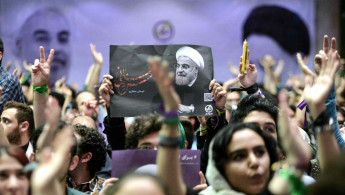Rouhani, Revolutionary Guards nuclear deal-spat escalates as elections loom
In a presidential TV debate on Friday Rouhani accused the Revolutionary Guards of seeking to sabotage a landmark nuclear deal signed by Iran, the US, and five other states, by testing ballistic missiles with provocative anti-Israeli messages displayed on them.
"We saw what they did in order to disrupt [the deal]," said Rouhani, who is running for re-election and is viewed as a moderate figure.
"They wrote messages on the missiles so that we won’t be able to reap its benefits," said Rouhani.
Ballistic messages
In March 2016, only two months after nuclear sanctions were lifted, the Revolutionary Guards broadcast their testing of two ballistic missiles.
The missiles contained a message written in Hebrew that read: "Israel must vanish from the page of time."
Addressing his fellow candidates on Friday Rouhani also questioned their commitment to upholding the deal:
"You were against it from day one, and when [US President Donald] Trump took office you all celebrated saying he would tear up the deal. Today our people are entitled to know whether once again confrontation and sanctions are going to be imposed or not," said Rouhani.
No candidate responded that they would seek to abandon the deal. But hardliner Ebrahim Raisi, seen as a central challenger to Rouhani, said that the agreement had to date failed to bring economic benefits.
This accusation was also levelled by Tehran mayor, and fellow candidate Mohammad-Bagher Ghalibaf, viewed as a conservative.
In response Rouhani said that the deal had allowed a massive increase in oil sales and opened the way for Iran to take a central position in regional diplomacy.
But his comments are likely to anger figures within both the Revolutionary Guards - established after Iran's 1979 revolution - and the country's regular army.
A deepening quarrel?
"We again stress and recommend the presidential candidates to avoid controversial entries into important and sensitive military and defence issues of the country and giving false information to people," Jazayeri was quoted as saying.
"The existence of underground missile sites are an important deterrent factor against the sworn enemies of the Islamic Republic of Iran and the nation."
Six candidates are currently competing in Iran's presidential election having been vetted by the country's conservative-controlled Guardian Council: three conservatives, and three moderate, reformists.
Analysts expect the other moderate candidates, vice-president Eshaq Jahangiri and Mostafa Hashemitaba, to withdraw at the last minute to boost Rouhani's chances.
The conservatives were fatally split in 2013, and it is still unclear whether Raisi, Ghalibaf or the third conservative, Mostafa Mirsalim, will agree to rally round the most likely contender.
Public criticism of the Revolutionary Guards is rare in Iran.
Rouhani's comments have been seen as evidence of his frustration with the hugely influential military institution which functions with independence, on parallel lines, from the elected government, and the regular army, and is also strongly aligned to conservative groups in the country many of whom reject the nuclear deal signed by Tehran.





 Follow the Middle East's top stories in English at The New Arab on Google News
Follow the Middle East's top stories in English at The New Arab on Google News
![22 Arab countries at COP29 have rejected the targeting of fossil fuels [Getty]](/sites/default/files/styles/image_330x185/public/2024-11/GettyImages-2184289638.jpg?h=199d8c1f&itok=ptHl5bec)
![Dozens of people turned out for the funerals [Getty]](/sites/default/files/styles/image_330x185/public/2024-11/GettyImages-2185229760.jpg?h=e7c891e8&itok=1bctDcE6)
![The UAE is widely suspected of arming the RSF militia [Getty]](/sites/default/files/styles/image_330x185/public/2024-11/GettyImages-472529908.jpg?h=69f2b9d0&itok=Yauw3YTG)